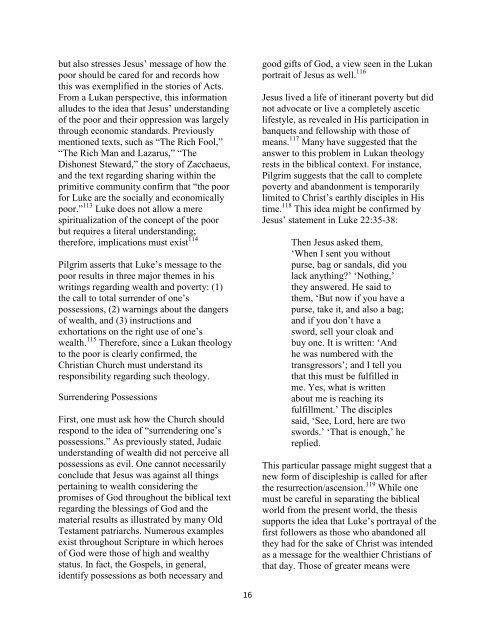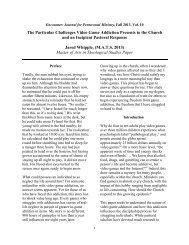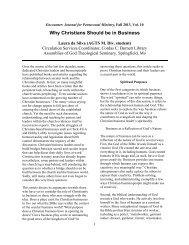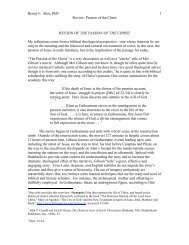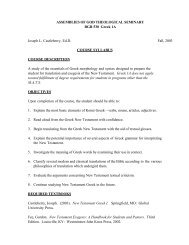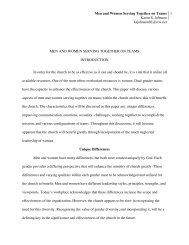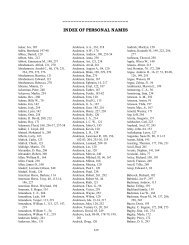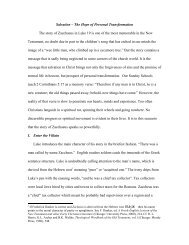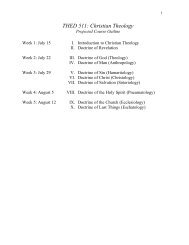Encounter: Journal for Pentecostal Ministry - Assemblies of God ...
Encounter: Journal for Pentecostal Ministry - Assemblies of God ...
Encounter: Journal for Pentecostal Ministry - Assemblies of God ...
Create successful ePaper yourself
Turn your PDF publications into a flip-book with our unique Google optimized e-Paper software.
ut also stresses Jesus‟ message <strong>of</strong> how the<br />
poor should be cared <strong>for</strong> and records how<br />
this was exemplified in the stories <strong>of</strong> Acts.<br />
From a Lukan perspective, this in<strong>for</strong>mation<br />
alludes to the idea that Jesus‟ understanding<br />
<strong>of</strong> the poor and their oppression was largely<br />
through economic standards. Previously<br />
mentioned texts, such as “The Rich Fool,”<br />
“The Rich Man and Lazarus,” “The<br />
Dishonest Steward,” the story <strong>of</strong> Zacchaeus,<br />
and the text regarding sharing within the<br />
primitive community confirm that “the poor<br />
<strong>for</strong> Luke are the socially and economically<br />
poor.” 113 Luke does not allow a mere<br />
spiritualization <strong>of</strong> the concept <strong>of</strong> the poor<br />
but requires a literal understanding;<br />
there<strong>for</strong>e, implications must exist 114<br />
Pilgrim asserts that Luke‟s message to the<br />
poor results in three major themes in his<br />
writings regarding wealth and poverty: (1)<br />
the call to total surrender <strong>of</strong> one‟s<br />
possessions, (2) warnings about the dangers<br />
<strong>of</strong> wealth, and (3) instructions and<br />
exhortations on the right use <strong>of</strong> one‟s<br />
wealth. 115 There<strong>for</strong>e, since a Lukan theology<br />
to the poor is clearly confirmed, the<br />
Christian Church must understand its<br />
responsibility regarding such theology.<br />
Surrendering Possessions<br />
First, one must ask how the Church should<br />
respond to the idea <strong>of</strong> “surrendering one‟s<br />
possessions.” As previously stated, Judaic<br />
understanding <strong>of</strong> wealth did not perceive all<br />
possessions as evil. One cannot necessarily<br />
conclude that Jesus was against all things<br />
pertaining to wealth considering the<br />
promises <strong>of</strong> <strong>God</strong> throughout the biblical text<br />
regarding the blessings <strong>of</strong> <strong>God</strong> and the<br />
material results as illustrated by many Old<br />
Testament patriarchs. Numerous examples<br />
exist throughout Scripture in which heroes<br />
<strong>of</strong> <strong>God</strong> were those <strong>of</strong> high and wealthy<br />
status. In fact, the Gospels, in general,<br />
identify possessions as both necessary and<br />
16<br />
good gifts <strong>of</strong> <strong>God</strong>, a view seen in the Lukan<br />
portrait <strong>of</strong> Jesus as well. 116<br />
Jesus lived a life <strong>of</strong> itinerant poverty but did<br />
not advocate or live a completely ascetic<br />
lifestyle, as revealed in His participation in<br />
banquets and fellowship with those <strong>of</strong><br />
means. 117 Many have suggested that the<br />
answer to this problem in Lukan theology<br />
rests in the biblical context. For instance,<br />
Pilgrim suggests that the call to complete<br />
poverty and abandonment is temporarily<br />
limited to Christ‟s earthly disciples in His<br />
time. 118 This idea might be confirmed by<br />
Jesus‟ statement in Luke 22:35-38:<br />
Then Jesus asked them,<br />
„When I sent you without<br />
purse, bag or sandals, did you<br />
lack anything?‟ „Nothing,‟<br />
they answered. He said to<br />
them, „But now if you have a<br />
purse, take it, and also a bag;<br />
and if you don‟t have a<br />
sword, sell your cloak and<br />
buy one. It is written: „And<br />
he was numbered with the<br />
transgressors‟; and I tell you<br />
that this must be fulfilled in<br />
me. Yes, what is written<br />
about me is reaching its<br />
fulfillment.‟ The disciples<br />
said, „See, Lord, here are two<br />
swords.‟ „That is enough,‟ he<br />
replied.<br />
This particular passage might suggest that a<br />
new <strong>for</strong>m <strong>of</strong> discipleship is called <strong>for</strong> after<br />
the resurrection/ascension. 119 While one<br />
must be careful in separating the biblical<br />
world from the present world, the thesis<br />
supports the idea that Luke‟s portrayal <strong>of</strong> the<br />
first followers as those who abandoned all<br />
they had <strong>for</strong> the sake <strong>of</strong> Christ was intended<br />
as a message <strong>for</strong> the wealthier Christians <strong>of</strong><br />
that day. Those <strong>of</strong> greater means were


